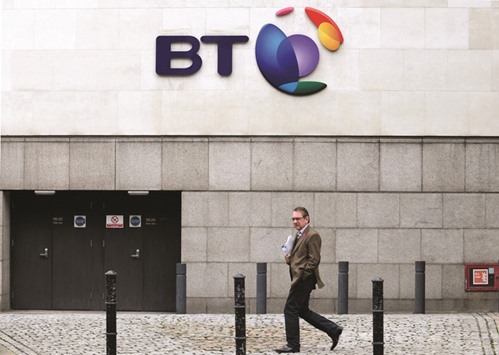BT Group’s earnings rose last quarter after the UK’s biggest broadband provider that’s pushing into mobile and pay-television won more customers for its Internet and video products.
Adjusted earnings before interest, taxes, depreciation and amortisation rose 3% to £1.61bn ($2.3bn) in the three months ended December, the London-based company said yesterday. That compares with the £1.58bn average of estimates compiled by Bloomberg. Sales rose 3% to £4.59bn, compared with the average estimate of £4.46bn.
The former British telephone monopoly is reinventing itself with mobile and pay-TV products. In addition to the TV channels - used to win users to its high-speed fiber Internet service and away from rivals such as Sky Plc - BT bought EE in a £12.5bn deal, giving it access to the country’s biggest mobile carrier by customers.
“EE gives us an opportunity for revenue synergies,” Chief Financial Officer Tony Chanmugam said on Bloomberg TV. When it comes to TV, BT seeks to be “a strong No 2 to Sky,” he said.
BT’s Openreach Internet network added 494,000 fibre broadband customers, about half of which were gains by other services providers that BT sells access to.
The company added 97,000 TV customers in the period for a total of 1.4mn. To boost its TV offerings, the company has bought Champions and Europa League rights and started new premium channels, charging customers for more games and offering an ultra-HD channel that works with so-called 4K resolution TVs.
The acquisition of EE, whose brand will be retained, means Deutsche Telekom AG is the new company’s biggest shareholder with a 12% stake and a seat on the board. Orange SA owns 4%. Deutsche Telekom is open to buying Orange’s holding, people familiar with the matter have said.
BT also announced a new structure of its businesses, including a split of its services division, with one unit focusing on business and public clients in the U.K, and the other serving multinational companies and clients abroad.

..
